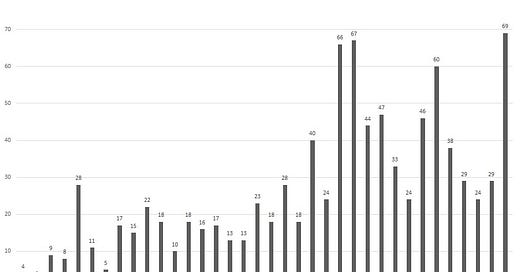The Use of Trade Remedies in Brazil: Insights from Lula’s Third Term (2023–2024)
2025 Winter - Luiza Nonato
The use of trade remedies during the first half of Lula’s third term saw a notable increase in investigations, encompassing initiations, sunset reviews, and other related procedures.
According to Figure 1, the Brazilian authority conducted 69 investigations in 2024, including 40 initiations, 27 sunset reviews, one redetermination, and one countervailing duty investigation. This is a significant increase from the previous year when it conducted 29 investigations, including seven initiations, 15 sunset reviews, two anti-circumvention reviews, and one countervailing duty investigation. Currently, 145 trade defense measures are in force.
Figure 1: Brazil: Trade defense measures investigations, 1988-2024. It includes anti-dumping (initial investigations and sunset reviews), countervailing measures and safeguards) — source: Ministry of Development, Industry and Trade.
This data reveals three significant trends:
The sharp increase in trade defense activity, from 29 investigations in 2023 to 69 in 2024, underscores a growing tendency among Brazilian industrial sectors to leverage trade remedies to address unfair trade. This may also be a strategic reaction to growing external competition, indicating a more protectionist-reliant stance in a progressively complex global trade environment.
The rise in the number of investigation openings, which increased more than fivefold from 7 in 2023 to 40 in 2024, indicates a shift towards addressing potentially new cases of dumping or subsidization, reflecting heightened import trends and their impacts on local markets.
Aligned with the overall increase in trade defense measures, the rising number of sunset reviews (15 in 2023 and 27 in 2024) suggests a continued effort to reassess the necessity of maintaining existing measures, ensuring their alignment with evolving trade dynamics.
For reference, the data used is available here.




